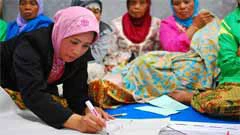Read this post in Español, Français

Today we are seeing business build far more sophisticated means of using modern technology to get feedback from their customers. It begs the question – if business can do that, why can't we try and do the same in the business of development - with the benefit of modern technology?
I've seen the evidence that we can do it. Last October at the World Bank, we applauded the work of teams in Bangladesh, Brazil, Cambodia and India, who've been using the mix of modern technology and development to boost results.
These teams had been focusing on how to improve the impact of Bank-funded projects on people's lives by systematically asking those citizens their opinion about the services they were receiving. It is in the end about empowering citizens – the ones who are on the receiving end of development assistance.
In itself it's not a new concept – around 22% of Bank projects have some form of citizen engagement; civil society and foundations and some governments have been working on collecting feedback from people impacted by projects through "scorecards" and community engagement for many years. But it did show that the power of technology is catching up with our bigger aspirations!
The teams found new and innovative ways to use new technology to record, curate and feed the results back to the Bank and government so that problems could be fixed and services could keep improving.
Rio Grande do Sul State Brazil allows 120,000 citizens to propose and vote on the web or phone to find new government policy solutions leading to new health services for women. Participation increased by 60 percent. The Bank project in Bangladesh asks 135 million citizens for their feedback, so the government can address grievances and improve service delivery.
In Cambodia, we support local government to better meet citizens' needs through designated service centers that ensure feedback and dialogue with district authorities. The Karnataka Maternal Health project in India allows Bank staff to get important health metrics and citizen feedback in "real-time" from illiterate pregnant mothers via a hand held device. This data is then centralized in an integrated dashboard which can alert staff when services are not being delivered to avoid failure, and manage risks.
So we know it can be done. The next step was to connect these innovators in the Bank with academics, civil society representatives, and foundations who like us have been grappling with these issues for years, to the vibrant technology community who want to use technology to solve the world's toughest problems, to government and the private sector. Result – the Citizen Voices conference.
What we know:
- Citizen engagement is essential for open government and effective development, strengthening the quality of policymaking and the "science" of service delivery with improved social accountability.
- But it's not a panacea -- you need a committed and responsive government too. There is often less discussion about to how to design and implement participatory processes that deliver their expected benefits. We know involving citizens is driving performance improvements in Kenya's Water and Sanitation Services. In the first two years of the pilot, the community groups solicited a total of over 400 complaints and successfully resolved 97% of them, some which had been outstanding for over 3 years. Overall, the project has broken new ground when it comes to community engagement.
- And participatory budgeting and new innovations in information communication technology are working to successfully build transparency, increase accountability and overcome a long history of mistrust in DRC South Kivu Province.
What we need to do and learn
- It's time to move from the rich experience and knowledge generated by many to concrete action on citizen engagement that leads to more effective development results.
- We need concrete partnerships among government, civil society, foundations and the private sector to scale up innovative and results-driven citizen feedback systems enhanced by ICT tools at global and country levels.
- We need to learn from others -- the private sector has a particular take on "consumer feedback" and I'll be chairing a session on this at "Citizen Voices."
- We'll hear from WaterHealth International about an inclusive business model that has received financing from the Bank's private sector arm, IFC. WaterHealth works to get a sustainable supply of quality drinking water to over two billion people on very low incomes with limited or no access to a guaranteed source of safe drinking water at an affordable price. Using groundbreaking, low-cost water purification technology with ultra violet light it operates more than 500 water purification plants in Bangladesh, Ghana, Liberia, India, and the Philippines.
- Another example is a survey of smallholder coffee farmers for a fair trade coffee buyer in Nicaragua that was financed by the Bank's private sector arm, IFC. This study clearly showed how farmer feedback can improve productivity and profitability by pin-pointing previously underappreciated farmer preferences. It also identified new service opportunities. All from listening to farmers.
Citizen Voices is just the beginning of the Bank's work to mainstream citizen feedback in all our projects.


Join the Conversation